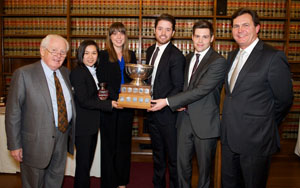
The Lenczner Slaght CBA Gale Cup is a truly national affair. A bilingual competition focused on criminal-constitutional law, competitors make submissions in either official language to real judges from various Canadian trial and appellate courts.
This year was the 40th annual Gale Cup, which has grown into what Sen. David Smith affectionately called a pilgrimage for students and coaches from virtually every Canadian faculty of law. It took place at Osgoode Hall on Feb. 22-23.
The distinguished panel for the final round was composed of Justice Richard Wagner, the most recent appointee to the Supreme Court of Canada, Justice Holly Beard of the Manitoba Court of Appeal, and Justice Allan Hilton of the Quebec Court of Appeal.
The case under appeal was
R. v. D.A.I., a recent 6-3 split decision of the Supreme Court concerning the circumstances in which unsworn testimony by an adult with a mental disability whose capacity is challenged may be received by a court.
The issue in
D.A.I. was whether the trial judge erred in his application of s. 16 of the Canada Evidence Act when he found that the witness, a severely mentally disabled complainant, was not competent to testify. The witness’ evidence raised very serious concerns in the mind of the trial judge about whether the witness understood what it meant to promise to tell the truth.
A majority of the Supreme Court agreed with Chief Justice Beverley McLachlin that the trial judge erred by improperly considering the witness’ abstract understanding of what it meant to promise to tell the truth. Justice Ian Binnie, dissenting, argued that the majority’s decision turned the requirement into an empty formality — a mere mouthing of the words “I promise” — thereby diluting the protection Parliament intended to provide to accused persons.
The competition was fierce in the preliminary rounds. Participants, dressed in their best moot suits, invariably rose to the challenge — provided, of course, the unfamiliar gowns which they had donned for the occasion did not get in the way. After completion of each competitor’s submissions, which included a barrage of questions from veteran members of the bench, it was all over. Save for a select few.
In the end, Osgoode Hall Law School took first place, followed by Université du Québec à Montréal, University of Alberta, and Université Laval.
At the banquet in Convocation Hall following the finals, Wagner offered three tips to the competitors as they embark on their professional lives:
1. maintain their sense of adventure regarding possible career paths
2. be creative in their approach to the law
3. always include their contribution to society at large in their measuring stick of success
Osgoode was awarded the Peter Cory prize for top factum, followed by UQAM, and Queen’s University.
The unmatched success of female competitors in the top oralist categories continued this year. The Dickson Medal for top oralist in the final rounds went to Osgoode’s Phi Nguyen. Dickson Medals for the preliminary rounds also went to U of A’s Mandy Kahlmeier and UQAM’s Julie Anne Marinier, who also received the McLachlin Prize for Top Female Oralist.
After the highs and lows of a two-day competition, participants, judges, and coaches gathered following the banquet at the after-party for a much-needed chance to socialize, relax, congratulate each other, and join in their mutual appreciation for what is likely the consensus pick for the most important part of any moot competition — the free food and drink.
Andrew Porter is a first-year associate at Lenczner Slaght Royce Smith Griffin LLP in Toronto.

 The Lenczner Slaght CBA Gale Cup is a truly national affair. A bilingual competition focused on criminal-constitutional law, competitors make submissions in either official language to real judges from various Canadian trial and appellate courts.
The Lenczner Slaght CBA Gale Cup is a truly national affair. A bilingual competition focused on criminal-constitutional law, competitors make submissions in either official language to real judges from various Canadian trial and appellate courts.